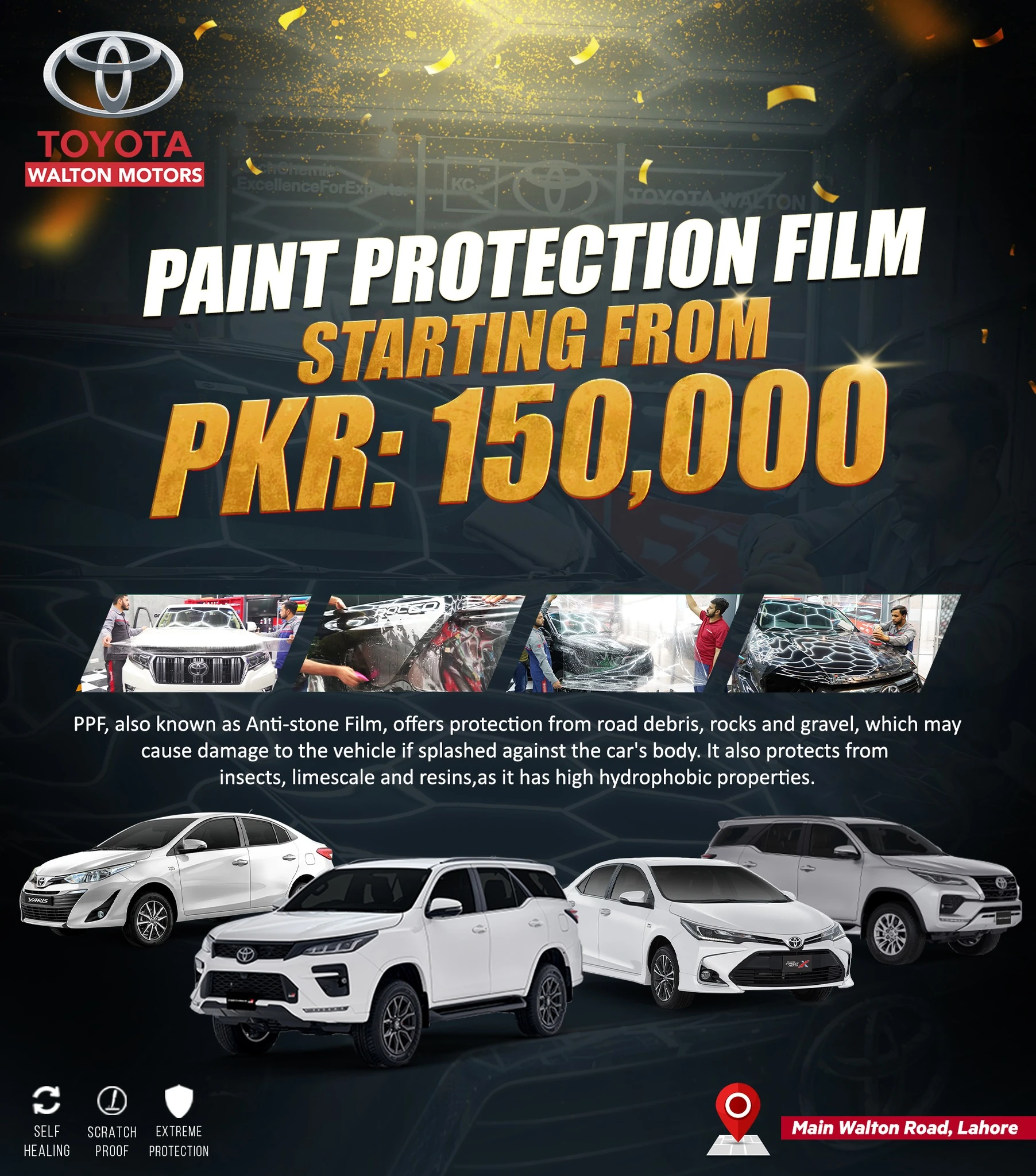Toyota Walton Motors is offering our PPF discounted campaign
آج ہی اپنی گاڑی کے اوپر پینٹ پروٹیکشن فلم لگوائیں
PPF, also known as Anti-stone Film, offers protection from road debris, rocks and gravel, which may cause damage to the vehicle if splashed against the car’s body. It also protects from insects, limescale and resins,as it has high hydrophobic properties.
- Preserves Paint
- Increases Resale Value
- Scratchproof
- Enhances Gloss & Shine
- Invisible Protection
- Easy Maintenance
- TPU Material
- Pre Ceramic Coated
- Self Healing Properties
- Highly Gloss
- Highly Hydrophobic Effect
Comprehensive Guide to Paint Protection Film (PPF)
Welcome to our detailed guide on Paint Protection Film (PPF). In this article, we’ll explore the benefits, applications, and superior protective qualities of PPF for your vehicle’s paint finish. As leading experts in PPF installation, we’re excited to share our knowledge with you.
What is Paint Protection Film (PPF)?
Paint Protection Film (PPF) is a transparent, self-adhesive film applied to a vehicle’s painted surfaces to guard against various forms of damage. Acting as a shield, PPF protects against scratches, stone chips, road debris, UV rays, and other environmental contaminants, preserving your vehicle’s paint finish.
PPF is known for its durability and some variants even have self-healing properties that repair minor scratches over time. Its clear, almost invisible nature ensures that it doesn’t alter the vehicle’s aesthetics while providing optimal protection. PPF is popular among car enthusiasts, luxury vehicle owners, and everyday drivers looking to protect their investments and maintain their vehicle’s resale value.
Benefits of Paint Protection Film
The benefits of Paint Protection Film (PPF) make it a highly sought-after solution for vehicle owners:
- Exceptional Protection: Shields against scratches, stone chips, and road debris, keeping your vehicle’s paint pristine.
- Environmental Defense: Acts as a barrier against UV rays, bird droppings, and tree sap, preventing paint damage.
- Self-Healing: Some PPF variants can repair minor scratches, maintaining a flawless appearance.
- Resale Value: Preserves the original paint finish, enhancing your vehicle’s resale value.
- Invisible Protection: Clear film that maintains the vehicle’s aesthetics.
- Easy Maintenance: Requires minimal effort to clean and maintain.
PPF Installation Process
The PPF installation process is meticulous, carried out by skilled professionals to ensure optimal protection:
- Preparation: The vehicle’s surface is cleaned thoroughly to remove dirt and contaminants.
- Measurement and Cutting: PPF is measured, cut, and shaped to fit each specific panel.
- Application: The film is applied using a solution to allow for repositioning and alignment.
- Smoothing: Air bubbles are removed with a squeegee for a seamless finish.
- Heating: Technicians heat the film to conform it to complex curves and contours.
- Controlled Environment: Installation is done in a controlled environment to prevent dust and particles from affecting adhesion.
The result is a virtually invisible protective layer that seamlessly adheres to the vehicle’s surface, safeguarding it from damage and preserving the original paint finish.
Comparing PPF to Other Protection Methods
When compared to other vehicle protection methods, Paint Protection Film (PPF) stands out for its effectiveness:
- Superior Protection: Unlike waxing or sealants, PPF offers long-lasting protection against scratches, stone chips, and environmental damage.
- Physical Barrier: PPF forms a physical barrier on the paint surface, unlike ceramic coatings which mainly provide hydrophobic properties.
- Durability: Highly resistant to fading and discoloration, PPF offers reliable protection over time.
- Self-Healing: Unique self-healing properties repair minor scratches, a feature not found in other methods.
- Comprehensive Coverage: Unlike car bras or covers that protect only the front end, PPF covers the entire painted surface.
Overall, Paint Protection Film is the optimal choice for those seeking a premium, long-lasting solution to safeguard their vehicle’s paint and maintain its pristine appearance.
